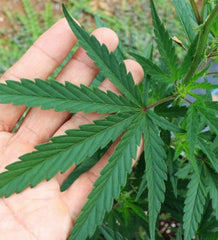
CBD and Parkinson's: Symptom Relief and Promising Research
Understanding Parkinson's Disease
Parkinson's disease, a neurodegenerative disorder prevalent inolder adults , manifests through a variety of motor and non-motor symptoms.
Motor symptoms:
- Muscle stiffness
- Bradykinesia (slowness of movement)
- Tremors at rest
Non-motor symptoms:
- Digestive disorders
- Sleep problems
- Anxiety and depression
These symptoms can have a profound impact on the daily lives of individuals affected by Parkinson's disease, requiring a comprehensive and holistic approach for effective management.
Current treatments and limitations
Currently, treatments focus on symptom management and compensating for dopamine loss. However, these treatments are only symptomatic and have limitations, including the "on/off" phases and side effects of dopaminergic medications.
This is why some people are interested in gentle, natural alternatives such as CBD.
Research on the potential of CBD in Parkinson's disease
Cannabidiol (CBD) is a non-psychoactive compound found in cannabis, known for its relaxing and calming properties, without inducing the euphoria associated with tetrahydrocannabinol (THC).
Antioxidant and anti-inflammatory properties of CBD
The antioxidant and anti-inflammatory properties of CBD are attracting increasing interest in the field of Parkinson's disease. In vitro and animal model studies have shown that CBD can reduce inflammation and oxidative stress, potentially contributing toneuroprotection .
These effects could play a crucial role in slowing disease progression by limiting cellular damage and preserving neuronal function.
Influence of CBD on the regulation of movement and mood
Preliminary studies suggest that CBD may influence movement and mood regulation systems, offering promising prospects for managing motor and non-motor symptoms of Parkinson's disease.
Research in animal models of Parkinson's disease has demonstrated potential improvements in movement after CBD administration. These findings raise hopes for developing complementary treatments to alleviate disabling motor symptoms.
Complex interactions of CBD with dopamine receptors
The motor symptoms of Parkinson's disease are largely attributable to the degeneration of dopaminergic neurons and disruption of the dopaminergic transmission system.
Studies suggest that CBD may complexly modulate dopamine receptors, which could potentially influence motor symptoms and movement fluctuations observed in patients.
Effect of CBD on serotonin receptors
Non-motor symptoms of Parkinson's disease, such as anxiety and depression, are linked to dysfunctions in the brain's serotonin system. CBD interacts with serotonin receptors, opening the door to potential relief from these symptoms.
Research aimed at better understanding this interaction could shed light on new therapeutic approaches to improve patients' overall quality of life.
CBD as a support for patient well-being
Thanks to its multiple benefits , CBD could offer valuable support to improve the quality of life of patients with Parkinson's.
Anxiety and stress management
The anxiolytic properties of CBD may help reduce anxiety and stress associated with the disease. Clinical studies on various anxiety disorders have shown positive effects of CBD, suggesting it may also be beneficial for Parkinson's patients.
Improved sleep
Sleep disturbances are common in Parkinson's patients and can worsen other symptoms. CBD may contribute to sleep quality by regulating sleep cycles and reducing insomnia.
Pain relief
Muscle and joint pain are common in Parkinson's disease, partly due to muscle stiffness. CBD's anti-inflammatory and relaxing properties may help alleviate this pain, improving patient mobility and comfort.
Forms of CBD consumption for Parkinson's patients
Different forms of CBD are available, each with its own benefits:
Sublingual oil
CBD oil administered under the tongue is a common option for rapid absorption. It can help manage anxiety, improve sleep, and relieve pain. However, it is essential to determine the appropriate dosage while considering drug interactions.
CBD Massage Oil
CBD massage is an interesting approach to relieving muscle and joint tension in Parkinson's patients. This method may help improve mobility and reduce pain. Note that it's possible to create your own massage oil by adding a few drops of CBD to a neutral oil, such as coconut or sweet almond oil.
CBD Infusions
CBD infusions , such as herbal teas, may be beneficial for digestive disorders and sleep. However, caution should be exercised due to potential effects on blood pressure and interactions with other medications.
Use of flowers and resins
In addition to the methods mentioned above, CBD flowers and resins can also be consumed in food, mixed into dishes or drinks. Additionally, they can be vaporized with a quality vaporizer. This offers an additional alternative for patients looking to incorporate CBD into their routine.
CBD Precautions in Parkinson's Disease
Medical consultation and interactions
When it comes to using CBD to treat the symptoms of Parkinson's disease, it's crucial to take precautions and consult a healthcare professional, especially if you're already taking medication.
Although CBD has shown few interactions with other medications and is generally well tolerated, everyone reacts differently. Therefore, it is recommended to seek the advice of your doctor to determine if CBD is appropriate for you, and what forms and doses are most appropriate.
Personalization of treatment
The choice of CBD form and dosage will depend on several factors, including the severity of your symptoms, your medical history, and your personal preferences. That's why a healthcare professional is essential to guide these important decisions.
Choose a reliable source
If you're considering purchasing CBD, it's a good idea to choose a reliable and reputable source. Choosing specialty stores like Famous CBD ensures that their products have undergone strict quality controls and meet European standards.
This means the products contain less than 0.3% THC, eliminating any risk of unwanted psychoactive effects. This quality assurance ensures a positive and safe experience when using CBD to manage the symptoms of Parkinson's disease.
CBD: Hope for neuroprotection
As research on CBD and Parkinson's disease progresses, a glimmer of hope is emerging for improving patients' quality of life. CBD's potential for symptom management, improved mental and physical well-being, and reduced side effects of existing treatments is promising.
However, it is imperative to emphasize that the use of CBD in Parkinson's patients must be undertaken under proper medical supervision. This precaution ensures the safety and effectiveness of any treatment considered.
If you or a loved one are affected by Parkinson's disease, don't hesitate to consult a healthcare professional to discuss possible options, including the use of CBD. The road can be challenging, but it's important to stay positive and seek solutions that will improve your well-being. You are not alone in this fight, and significant advances are on the horizon.
Let us never forget that hope is a powerful force, capable of inspiring positive change and moving mountains.





